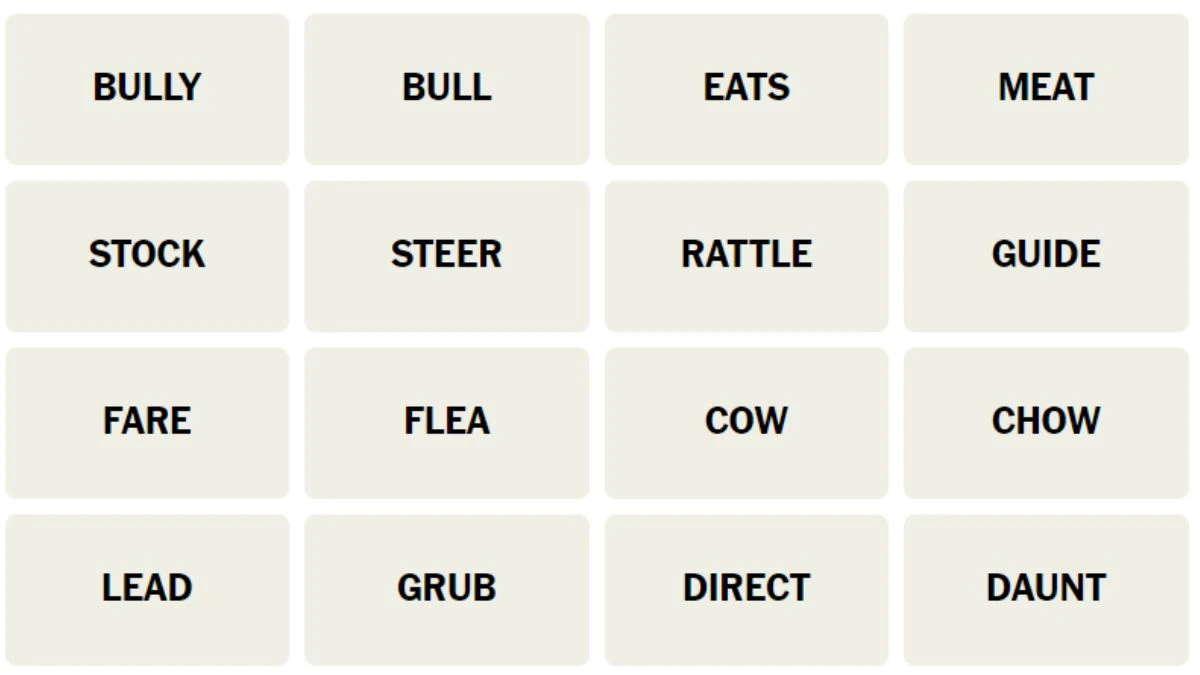NYT Connections Hints And Answers for May 29, 2024
by
Updated May 29, 2024

NYT Connections Puzzle
Connections NYT is a daily game where players are presented with a grid of words organized into groups. Each group contains four words, and the objective is to identify the common thread or connection between the words in each group. Players must select four groups of four words each without making more than four mistakes.
Today NYT Connections Words May 29, 2024
Here are the 16 words for today’s connections puzzle #353.
- BULLY
- STOCK
- STEER
- FARE
- LEAD
- BULL
- FLEA
- GRUB
- DIRECT
- EATS
- RATTLE
- COW
- MEAT
- GUIDE
- CHOW
- DAUNT
NYT Connections Hints for May 29, 2024
Here we have provided 4 hints for each of the word groups in today's NYT Connections Game #353. These hints will help you to solve today's NYT Connections Puzzle.
- Yellow: Slang for dinner
- Green: Anjin
- Blue: Shake someone's nerves
- Purple: Types of markets
Today NYT Connections Categories for May 29, 2024
Dive into today's NYT Connections challenge, where you'll decipher groups of four items sharing a common thread. Exercise your wit and lateral thinking to unlock the patterns and solve the puzzles
- Yellow: Food
- Green: Pilot
- Blue: Intimidate
- Purple: ___Market
NYT Connections Answers for May 29, 2024
The answers to the puzzles in the NYT Connections #353, which were printed on May 29, 2024, are as follows:
- Food: CHOW, EATS, FARE, GRUB
- Pilot: DIRECT, GUIDE, LEAD, STEER
- Intimidate: BULLY, COW, DAUNT, RATTLE
- ___Market: BULL, FLEA, MEAT, STOCK
Chow
Informal term for food, often used to describe hearty, filling meals. It's commonly associated with military or casual dining settings.
Eats
A casual and friendly way to refer to food, emphasizing the act of eating. It suggests enjoyable or tasty food, often in a relaxed setting.
Fare
Refers to the type or range of food provided, particularly in a specific setting like a restaurant or event. It can denote the style or quality of the food offered.
Grub
Slang for food, typically implying simple, unpretentious meals. It's often used in a casual or rustic context.
Direct
To manage the course or actions of the aircraft, ensuring it follows a planned route or protocol. A pilot directs the flight operations and coordinates with air traffic control.
Guide
To navigate the aircraft, often referring to providing instructions or assistance in ensuring a safe journey. Pilots guide the plane through various phases of flight, from takeoff to landing.
Lead
To take charge of the flight, making critical decisions and overseeing the crew. A pilot leads the team, ensuring that all aspects of the flight are conducted safely and efficiently.
Steer
To physically control the direction of the aircraft using the flight controls. Pilots steer the plane to maintain the correct course and respond to changing conditions.
Bully
A bully is someone who habitually seeks to harm or intimidate those perceived as vulnerable or weaker, often through verbal or physical aggression. Bullying can occur in various settings such as schools, workplaces, or even online platforms.
Cow
While "cow" could refer to the domesticated animal, in the context of intimidation, it might be used metaphorically to imply someone behaving passively or timidly, perhaps easily intimidated or controlled by others. It contrasts with the image of a strong, assertive individual.
Daunt
To daunt someone is to make them feel intimidated or apprehensive, often by displaying courage, strength, or power. It's the act of instilling fear or doubt in someone, thereby discouraging them from proceeding with a particular action or pursuit.
Rattle
When someone is rattled, they are unsettled or disturbed, typically as a result of intimidation or fear. This term can be used to describe the emotional or psychological impact of intimidating behavior, causing someone to lose their composure or confidence.
Bull
In the stock market, a "bull" refers to a person who is optimistic and believes that the market or a particular stock will rise in value. A "bull market" is a financial market characterized by rising prices and investor optimism.
Flea
This term is less common in financial contexts, but in some cases, it might refer to smaller, less significant market participants who trade in small quantities or less actively compared to larger investors. Alternatively, it could refer to speculative or risky investments.
Meat
In the context of the market, "meat" could refer to the core or substance of a trading strategy or investment. It might suggest the essential part of an investment thesis or trading plan.
Stock
This is the most straightforward term; it refers to shares of ownership in a company. Owning stock represents a claim on part of the company's assets and earnings. Stocks are bought and sold on stock exchanges, and they can be a key component of an investment portfolio.